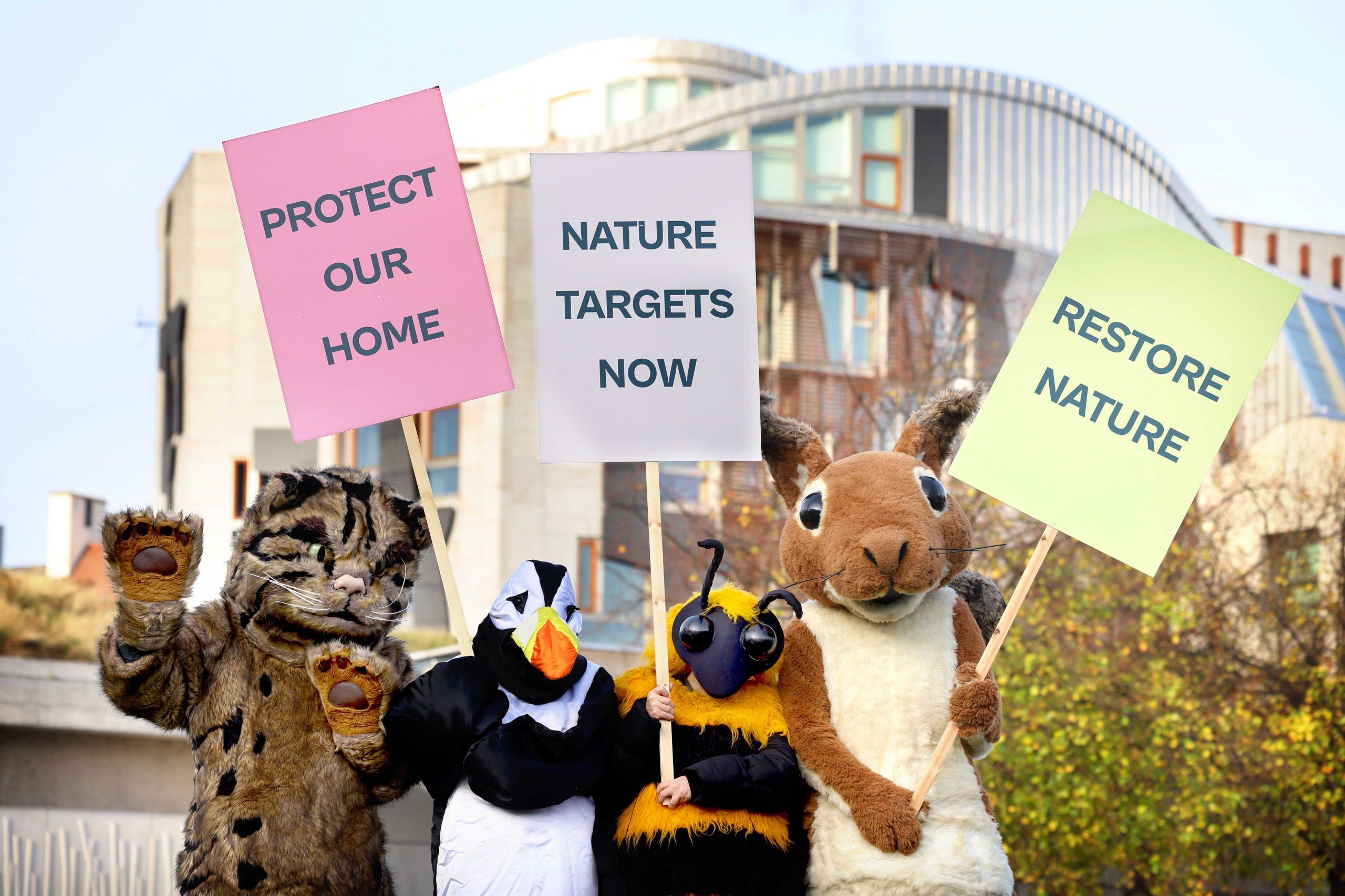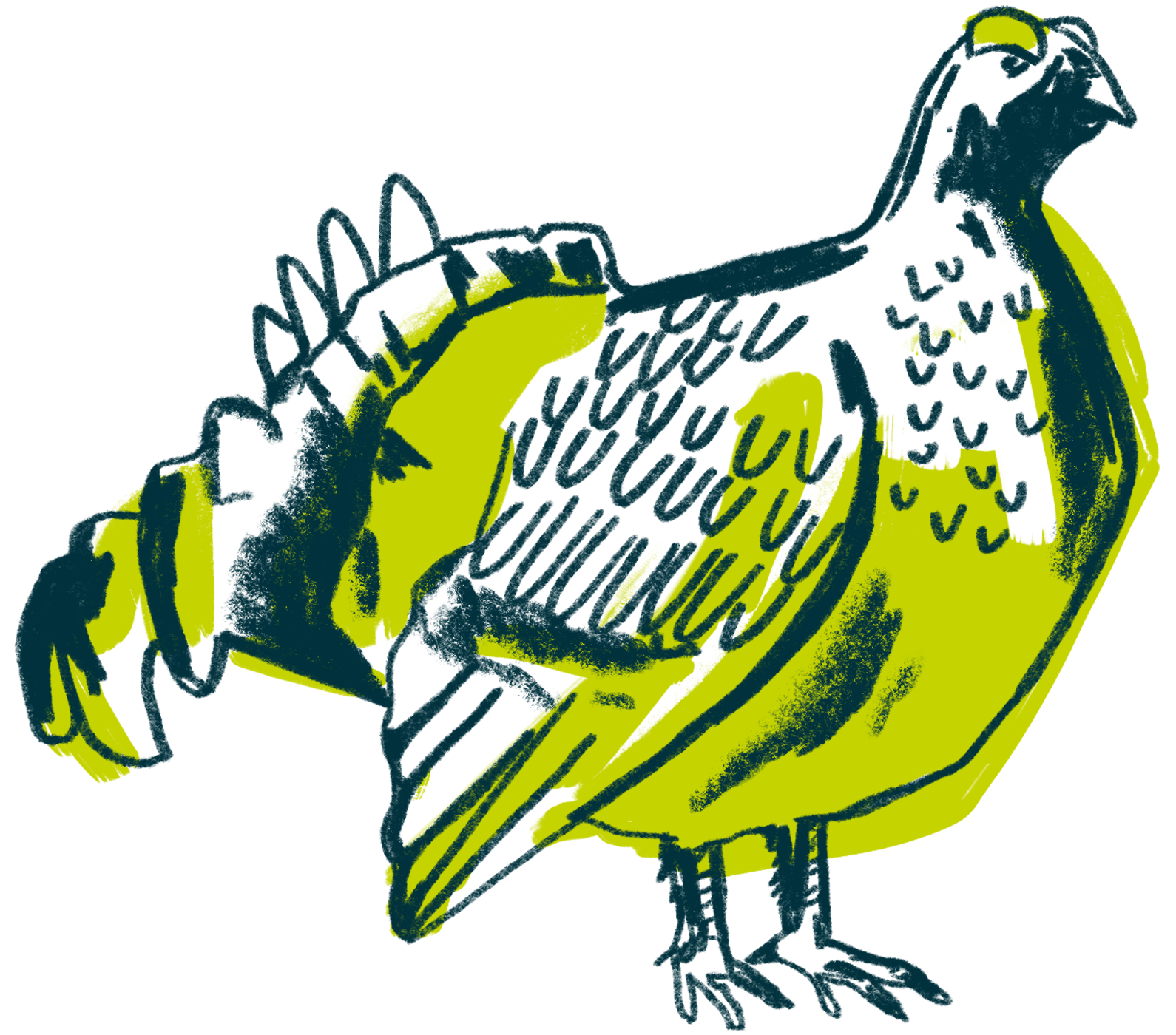
Threatened species highlight need for nature recovery targets
Campaigners wearing puffin, bumblebee, wildcat and red squirrel costumes demonstrated outside the Scottish parliament today as MSPs prepared to debate the Natural Environment Bill. The campaigners were representing wildlife because it cannot vote and held signs reading ‘Protect our home’, ‘Restore nature’ and ‘Nature targets now’.
The Natural Environment Bill, being debated this afternoon, is seen by campaigners as a vital opportunity to set strong and meaningful targets for nature recovery in Scotland.
One in nine species in Scotland is at risk of extinction, with almost half of species decreasing in number since the 1970s. Scotland ranks in the lowest 15% of countries globally for the overall health of its biodiversity.
Puffins are a ‘Red List’ species, meaning they are one of our most threatened birds. They are at risk of extinction in Scotland and worldwide. The Great Yellow bumblebee, now extinct from the rest of Britain, is hanging on in the very North of Scotland, the Orkneys and the Outer Hebrides. Wildcats are on the brink of extinction in Scotland, although the Saving Wildcats partnership is providing a lifeline by breeding cats for release into the wild. Scotland is home to 80% of the UK’s red squirrels, but this iconic species is under threat from the invasive, non-native grey squirrel.
The Scotland Loves Nature campaign calls on the Scottish government to set legally binding targets for nature recovery, as well as putting more funding in place to restore nature and helping communities to protect and restore their natural environment.
The campaign was launched by Scottish Environment LINK to demand urgent action to restore Scotland’s nature. It is backed by more than 40 organisations including the Scottish Wildlife Trust, the Royal Zoological Society of Scotland, WWF Scotland and RSPB Scotland.
Deborah Long, Chief Executive of Scottish Environment LINK, said:
“It’s hard to overstate the importance of the Natural Environment Bill. The nature we all love is in crisis, and we need urgent action to bring it back to health. If this bill results in strong nature targets it could galvanise that action and make sure future Scottish governments are required to do what’s needed to help nature recover.
“The Scotland Loves Nature campaign has demonstrated how deeply Scotland’s people care about the nature around them. We’re calling on MSPs to take heed and support action for nature in this bill. Today we’re here representing the wildlife that can’t vote but desperately needs our help to survive.”
More Information
Puffins
Puffins are on the UK’s Birds of Conservation Concern Red List and are at risk of national extinction in Scotland. Their numbers declined by 32% in Scotland between 2000-2021 (Seabirds Count). They are facing multiple threats including climate change, unsustainable fishing, and invasive species. Puffins are among the 70% of seabird species in decline in Scotland, and urgent measures are needed to bring them back from the brink.
Wildcats
Habitat loss, persecution and, more recently, interbreeding with domestic cats forced the Scottish wildcat population close to extinction. But in 2023 the Saving Wildcats project, led by the Royal Zoological Society of Scotland, began releasing wildcats bred for conservation into the Cairngorms National Park to restore the population. At least 24 kittens have been born in the wild to released females. For more information visit https://www.savingwildcats.org.uk/
Bumblebees
Bumblebees are vital pollinators of wildflowers and crops, yet many species are in decline across Scotland. Habitat loss, climate change, and pesticide use are driving these declines, and urgent action is needed to protect and restore the flower-rich habitats they depend on. The latest BeeWalk data (https://www.bumblebeeconservation.org/news/british-bumblebee-numbers-plummet-in-2024/) shows that 2024 was the worst year on record for bumblebees across Britain, with numbers down by nearly a quarter compared to the long-term average. Despite this, several rare species including the Great Yellow, Moss carder, Broken-belted and Bilberry bumblebee are doing better here than elsewhere in Britain, making Scotland a vital refuge. The Scottish Government has a clear responsibility to keep it that way. For more information visit https://www.bumblebeeconservation.org/
Red Squirrels
Red squirrel populations have seriously declined since the 1800s, when grey squirrels were first introduced to Scotland. Competition and the deadly squirrelpox virus have caused red squirrel numbers and territories to decline. Habitat loss, fragmentation and climate change are also contributing to this decline. Saving Scotland’s Red Squirrels is a partnership project led by Scottish Wildlife Trust and funded by NatureScot’s Nature Restoration Fund, transforming hope for native red squirrels by removing grey squirrels, creating space for reds to thrive in Scotland once again.

